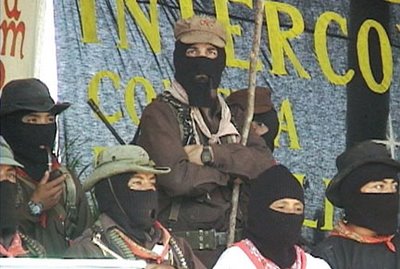 系里有一个与墨西哥ZAPATISTA原住民相处了十年的研究生。他常受邀分享有关ZAPATISTA革命运动的故事。有一次与他聊天时,他ZAPATISTA不要资本主义,也不要社会主义,也不是共产主义,我问:那他们要什么?他说:“如果椅子代表权力,政治人物就是常常拿起椅子要打人的家伙,公民社会团体则要求坐在椅子上对话,而ZAPATISTA要做的是把椅子分解、拆开。”
系里有一个与墨西哥ZAPATISTA原住民相处了十年的研究生。他常受邀分享有关ZAPATISTA革命运动的故事。有一次与他聊天时,他ZAPATISTA不要资本主义,也不要社会主义,也不是共产主义,我问:那他们要什么?他说:“如果椅子代表权力,政治人物就是常常拿起椅子要打人的家伙,公民社会团体则要求坐在椅子上对话,而ZAPATISTA要做的是把椅子分解、拆开。”萨帕塔运动是墨西哥境内一个为争取以原住民土地权及自治的原住民群体发起的。他们拒绝对环境资源不断进行剥削的资本主义、新自由主义、全球化。他们也因拒绝墨西哥政府处置原住民的政策而受到打压及迫害,他们出外活动时都蒙面以示“团结”,“不分你我”,也为他们的革命添上神秘色彩。
这种浪漫兼具抗争性的生活哲学深深吸引了我。他们把环境与人都看成 “主体”, 人与人、人与石头、人与树木都是“主体”,主体之间要沟通(说,听,了解,尊重)。他们的语言里没有“财产”及“客体“,他们相信,政府及资本家对天然资源进行掠夺的同时,环境与人们的身体同时都受伤、流血。
当打压及迫害是合法的,反迫害者变成了“叛军”。这样的群体活在这样的世界,注定是要拿起枪械来反抗的。不过,使用暴力不是他们的天性,唯一一次的武装起义是在1994年,综合原因包括原住民遭边缘化、贫穷、失业、新自由主义经济政策条款等长期累积的问题。此后数十年间,他们继续通过和平手段来宣扬他们的信仰。

A Mexican research student told me a lot about Zapatista Movement.He is always invited to give talks about this movement in the school. One thing he said impressed me : assuming that chairs are power, the politicians will use it to beat people, the civil society will try to sit on the chairs to discuss, but Zapatistas will cut the chairs into pieces.
These indigenous people believe that humans, songs, stones, and trees etc are all subjects. Intersubjective communication requires all subjects to "speak, listen, understand and respect each other."It is really attractive and romantic to some extent.Sometimes, I think we really need to learn how to live in harmony with Mother Nature from indigeous people who never talk about "pollution","finite resource"...etc.
When the oppressors use violence to oppress, the voiceless oppressed have no other choice but to resist and protect themselves with weapons.
However, Zapatista movement is pacific and non-violent. Although there was an armed uprising in 1994 to oppose social, political and historical injustice, they adopted unarmed and peaceful approach to promote their ideology.They are anti-capitalism, anti-neoliberalism, anti-globalization, etc. The Zapatista ideology of autonomy is unique.They see autonomy of the indigenous population as a solution to poverty ; they promote a kind of state within a state where peoples can keep their ways of government and communal way of life.
"The natural wealth that leaves these lands doesn't travel over just these three roads (leading to


No comments:
Post a Comment